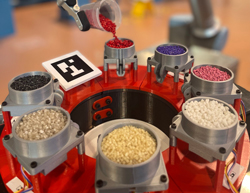
Upscaling and Technology Transfer will move ICTP research towards higher TRLs and semi-pilot scale production. This line will test the feasibility of upscaling in the ICTP’s main research areas, reducing the risks and costs associated with large-scale production. The ability to scale up research will also increase the ICTP’s chances of participating in consortia, particularly for European funding calls. Furthermore, we will encourage alliances with Technological Plastic Centres to scale up research to higher Technology Readiness Levels (TRLs).
Polymeric litter, including micro- and nano-sized plastics, has been documented in environments ranging from the highest mountains to ocean depths, rivers, forests and even the atmosphere. Addressing this issue requires a global effort to transition from a linear to a circular economy, involving policymakers, society, industry and research. In this context, the European Strategy for Plastics aims to enhance the circularity of polymers, contributing to the 2030 SGDs, the Paris Climate Agreement and the EU’s industrial policy objectives. Circularity and sustainability are now essential, not only for plastic products, but also for the entire field of Chemistry and Materials Science. Following Green Chemistry and Engineering Principles is now a necessity.
To address these challenges, the ICTP is launching this transversal strategy.